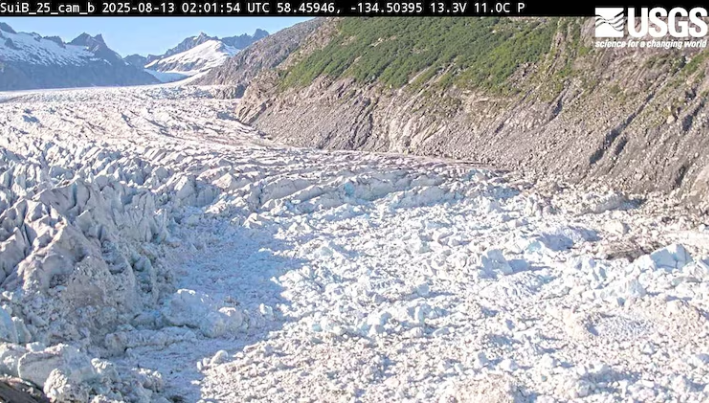Authorities in Juneau, Alaska, ordered widespread evacuations Wednesday as floodwaters from the Mendenhall Glacier surged past historic levels, threatening large sections of the city's 32,000 residents. Officials said the flooding - caused by a glacial lake outburst from Suicide Basin - had already broken previous records and posed a "life-threatening" risk.
The National Weather Service (NWS) reported that by 7 a.m. local time, the Mendenhall River had reached 16.51 feet, surpassing the 2024 record of 15.99 feet. Floodwaters were expected to crest near 8 a.m. before slowly receding through Thursday. The agency warned that rainfall had further complicated forecasts by rapidly raising lake and river levels after the subglacial release began Tuesday morning.
"Don't wait, Evacuate TONIGHT," the City of Juneau wrote in a Facebook post late Tuesday. Local officials also cautioned residents against driving through inundated roads within the flood zone. Alaska Senator Lisa Murkowski urged immediate compliance with evacuation orders, writing on X: "This is likely to become a life-threatening situation."
The flooding originated in Suicide Basin, a depression dammed by the retreating Mendenhall Glacier. Each summer since 2011, meltwater and rain have filled the basin until the pressure forces water beneath or around the ice dam, releasing millions of gallons downstream. While these glacial lake outburst floods, or GLOFs, are an annual occurrence, scientists say they have intensified as Alaska's climate warms at twice the U.S. average.
"This will be a new record based on all of the information we have," Nicole Ferrin of the NWS in Juneau said, according to the Juneau Empire. NOAA data show Alaska's average annual temperature has risen 3.1°F over the past century, accelerating glacier retreat and thinning. Rick Thoman, a climate specialist at the Alaska Center for Climate Assessment and Policy, told Climate.gov: "Without climate change, there is no reason to think that this would be happening on the Mendenhall Glacier, then in the lake, and downriver."
The August 2023 outburst destroyed multiple homes and eroded riverbanks at a rate officials said equaled a decade's worth of damage in a single weekend. Last year's flooding damaged nearly 300 homes, according to the Associated Press.
Globally, glaciers lost an estimated 7,211 billion tons of ice between 2000 and 2023, with the rate of loss rising 36% over the last two decades, a Nature study found earlier this year. Even if warming stabilizes, scientists expect glaciers to lose at least 39% of their mass.
The Mendenhall Glacier, about 12 miles from downtown Juneau, is a major tourist attraction and cultural landmark, originally known to the Tlingit people as Sitaantaagu or Aak'wtaaksit. Now receding at 100 to 150 feet per year, it has become a focal point for the visible impacts of climate change in Alaska.






